|
|
|
Sort Order |
|
|
|
Items / Page
|
|
|
|
|
|
|
| Srl | Item |
| 1 |
ID:
108691
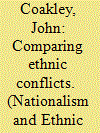

|
|
|
|
|
| Publication |
2009.
|
| Summary/Abstract |
Notwithstanding predictions over the past century and a half that minorities defined in ethnic, linguistic, or cultural terms would gradually reconcile themselves to coexistence in states dominated by metropolitan cultures, difficulties arising from the mobilization of minority communities continue to be pronounced at the beginning of the twenty-first century. This article provides an overview of the extent of ethnic division in modern states, describes characteristic patterns of ethnic mobilization and focuses on a smaller set of illustrative cases that reveal many of these patterns. In this, it defines the context for a set of case studies that follow: Belgium, Spain, Northern Ireland, Bosnia and Herzegovina, Cyprus, Lebanon, South Africa, and Sri Lanka.
|
|
|
|
|
|
|
|
|
|
|
|
|
|
|
|
| 2 |
ID:
084560


|
|
|
| 3 |
ID:
108703
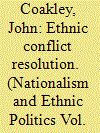

|
|
|
|
|
| Publication |
2009.
|
| Summary/Abstract |
This article generalizes on the basis of a set of case studies of ethnic conflicts that have followed different routes towards the goal of a long-term settlement: Belgium, Spain, Northern Ireland, Bosnia and Herzegovina, Cyprus, Lebanon, South Africa, and Sri Lanka. It begins by reviewing the significance of ethnicity in the modern state, exploring the political implications of different terminologies in this area. Having examined the patterns of political mobilization of ethnic groups (whether in the form of the party system or in the shape of military-type formations), it looks at the kinds of political outcome that have been associated with settlement processes. In addition to "solutions" that would be regarded as politically unacceptable, it identifies three common features which, depending on specific local circumstances, commonly occur: federal or other territorial arrangements, consociational government, and the political integration of minorities.
|
|
|
|
|
|
|
|
|
|
|
|
|
|
|
|
| 4 |
ID:
086973
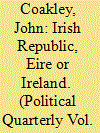

|
|
|
|
|
| Publication |
2009.
|
| Summary/Abstract |
One of the less visible consequences of the Good Friday (Belfast) Agreement of 1998 was that it finally put to rest a fifty year dispute between Ireland and the United Kingdom about the names of the respective states. This article begins by outlining the constitutional background to this complex terminological dispute, and then examines it from three perspectives. The first is that of the Irish state itself, which in recent decades has opted unambiguously for 'Ireland'. The second is the British government, which until the end of the twentieth century preferred the labels 'Eire' or 'Irish Republic'. The third is the militant nationalist republican movement, whose terminology was designed to deny the legitimacy of the existing state. The article concludes by examining the political significance of this issue, arguing that while its most obvious importance is symbolic, it has also had real meaning for the identity and for the geographical definition of the state, as well as for the British-Irish relationship.
|
|
|
|
|
|
|
|
|
|
|
|
|
|
|
|
| 5 |
ID:
058939
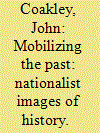

|
|
|
| 6 |
ID:
079971
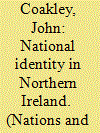

|
|
|
|
|
| Publication |
2007.
|
| Summary/Abstract |
This article addresses a set of fundamental, long-term factors associated with the Northern Ireland conflict: the pattern of underlying values and attitudes, especially those related to identity, that have helped to shape the nature of intercommunal competition. Using all generally available public opinion data, the article explores in particular the nature of national identity and of related forms of belonging for political behaviour. It notes the mutually reinforcing character of political loyalties within the Protestant community (where national identity, communal affiliation, constitutional preference and party support tend to coincide in a 'Protestant-unionist' package) and the failure of this to be matched within the Catholic community (where the components of the 'Catholic-nationalist' package are less closely interrelated). It concludes by speculating about the implications of these value configurations for political development, suggesting that they are unlikely to contribute to any fundamental political change in Northern Ireland in the short or medium term
|
|
|
|
|
|
|
|
|
|
|
|
|
|
|
|
| 7 |
ID:
101580
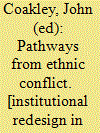

|
|
|
|
|
| Publication |
London, Routledge, 2010.
|
| Description |
xv, 230p.
|
| Series |
Routledge studies in nationalism and ethnicity
|
| Standard Number |
9780415554022, hbk
|
|
|
|
|
|
|
|
|
|
|
|
Copies: C:1/I:0,R:0,Q:0
Circulation
| Accession# | Call# | Current Location | Status | Policy | Location |
| 055632 | 305.8/COA 055632 | Main | On Shelf | General | |
|
|
|
|
| 8 |
ID:
154734
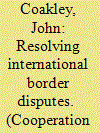

|
|
|
|
|
| Summary/Abstract |
This article explores the value of a specific model of norm replacement in accounting for the circumstances leading to Ireland’s Good Friday agreement (1998), which formally and finally settled the long-running territorial dispute between Ireland and the United Kingdom (UK). Drawing on the theoretical literature, it identifies three phases in this process. First, from the creation of the Irish Free State in 1922 until the civil unrest in Northern Ireland peaked in 1972 the irredentist norm was substantially unchallenged. It was embedded in the 1937 constitution, which defined the national territory as extending over the whole island of Ireland – including Northern Ireland, a part of the UK. The second phase, from about 1972 to 1998, was one of norm competition. The irredentist norm was severely challenged by new political realities in Northern Ireland, and was potentially destabilising for the state itself. It was increasingly challenged by an alternative ‘consent’ norm, one embracing in effect the geopolitical status quo. The third phase, from 1998 onwards, was one of consolidation of the new norm, now written into the Irish constitution to replace the wording of 1937. The article suggests that this model plays a valuable role in accounting for the changing status of the Irish border, but also that the Irish experience has implications for the broad shape of the model.
|
|
|
|
|
|
|
|
|
|
|
|
|
|
|
|
| 9 |
ID:
046312
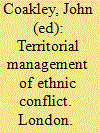

|
|
|
|
|
| Publication |
London, Frank Cass, 2003.
|
| Description |
xiii, 330p.
|
| Standard Number |
0714634654
|
|
|
|
|
|
|
|
|
|
|
|
Copies: C:2/I:0,R:0,Q:0
Circulation
| Accession# | Call# | Current Location | Status | Policy | Location |
| 039069 | 305.8/COA 039069 | Main | On Shelf | General | |
| 046402 | 305.8/COA 046402 | Main | On Shelf | General | |
|
|
|
|
|
|
|
|
|